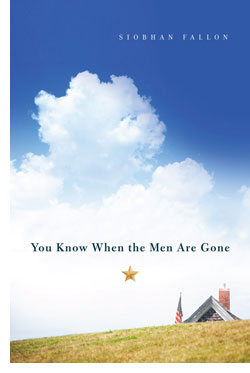 |
 |
 Siobhan Fallon
Siobhan Fallon
You Know When the Men Are Gone
Reviewed by: Rick Kleffel © 2011
Amy Einhorn Books / Random House
USA Trade Hardback, First Edition
ISBN 978-0-399-15720-2
Publication Date: 01-20-2011
228 pages, $23.95
Date Reviewed: 02-04-2011
Index:
General Fiction
Fantasy fiction is often defined by "world-building," the technique by which the writer creates a secondary world that may or may not resemble the world in which we live. Great attention is paid to details of character, location, language, history, and all of these are subtly or grossly different than those of the reality we find ourselves confronted with on a daily basis. From 'Lord of the Rings' to 'Dune' to 'The Stand,' world-building has been associated primarily with visions of pasts that never were or futures that might never come to pass.
But world-building is a writerly skill of use in this world, to create realities with which most of us are unfamiliar. Siobhan Fallon's 'You Know When the Men Are Gone' creates a world within our world, and tells us stories that show us who we might yet become.
Fallon is married to a commander in the United States Army, and her stories unfold in Fort Hood. The title story, "You Know When the Men Are Gone," is the first story she wrote while living on the base. It sets the scene with remarkable effectiveness. Meg is awaiting the return of her soldier, housed in an apartment complex with other Army wives, where she is almost forced to eavesdrop on her neighbors. Meg has the unfortunate luck to share a wall with Natalya. Natalya is foreign, abrupt, striking and clearly out-of-place. It's only a matter of time before she'll fall out of the world that Meg manages to secure a place in, just barely. It's complicated, with written rules about mowing the lawn and unwritten rules covering just about every moment of the day. Meg fits in; Natalya falls out.
In the story "Remission," Ellen Roddy ignores those rules at her peril, even if she is married to a commander and recovering from cancer. "Inside the Break," Kailani breaks into her absent husband's email to find some very suspicious messages, and the chatter among wives is not comforting. Fallon puts readers into the uneasy lives of the women left behind with alarming ease.
Fallon steps out of her own shoes and writes from the perspective of soldiers as well; "Camp Liberty" is the story of two men in one body; David Mogeson, a investment banker who signs up in the post-9/11 patriotic fever, and "Moge," a sergeant who becomes a squad leader, and a very different man than David Mogeson. In the sinister "Leave," Nick Cash returns home full of suspicion, intent on finding out if his wife is cheating on him. He does not realize that he's not the same man who left.
Fallon's stories are precise. They're extremely well-plotted and paced, each story offering another facet of life in the military, generally in Fort Hood. She creates memorable characters with economy and ease, working effortlessly within the short-story format. You'll remember these people after you read this book; they'll be friends you left behind.
Where you left them is part of the point and part of the power of 'You Know When the Men are Gone.' Fallon's stories interlock, giving us characters who appear in different roles, and seen from subtly different perspectives. The world she builds, the insular life of those in the US military, is complicated and peculiar and fraught with rules that, while they make a certain amount of sense, are still both logical and odd. As people from our world, from civilian life, come up against the often-necessary bureaucracy of the Army, Fallon uses her world-building skill to show us who we are, inside the walls, inside of our hearts.
No matter where you are, no matter what sort of life you are leading, the decisions you make will be human, and will play out in human terms. 'You Know When the Men are Gone' creates a world peopled by characters who once were like us, and may, once again, be like us. And though they may just as easily return to our world as aliens, as outliers, as outcasts, readers might be one step closer to seeing themselves in those distant eyes.
|
 |
|
|
 |
| |
Review Archive
All Reviews alphabetized by author.
General Fiction
Non-Genre, general fiction and literature.
Horror
Supernatural fiction, supernatural horror and non-supernatural horror.
Science Fiction
Science fiction, science fantasy, speculative fiction, alternate history.
Fantasy
Fantasy, surrealism and magic realism.
Mystery
Crime, thrillers, mystery, suspense.
Non-Fiction
Non-Fiction, True Crime, Forteana, Reference.
Poetry
|
|
 |
|




